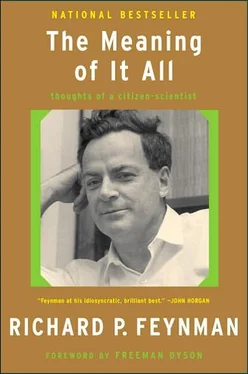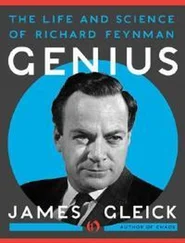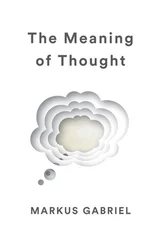The result of this self-study or thinking, or whatever it is, often ends with a conclusion that is very close to certainty that there is a God. And it often ends, on the other hand, with the claim that it is almost certainly wrong to believe that there is a God.
Now the second difficulty that the student has when he studies science, and which is, in a measure, a kind of conflict between science and religion, because it is a human difficulty that happens when you are educated two ways. Although we may argue theologically and on a high-class philosophical level that there is no conflict, it is still true that the young man who comes from a religious family gets into some argument with himself and his friends when he studies science, so there is some kind of a conflict.
Well, the second origin of a type of conflict is associated with the facts, or, more carefully, the partial facts that he learns in the science. For example, he learns about the size of the universe. The size of the universe is very impressive, with us on a tiny particle that whirls around the sun. That’s one sun among a hundred thousand million suns in this galaxy, itself among a billion galaxies. And again, he learns about the close biological relationship of man to the animals and of one form of life to another and that man is a latecomer in a long and vast, evolving drama. Can the rest be just a scaffolding for His creation? And yet again there are the atoms, of which all appears to be constructed following immutable laws. Nothing can escape it. The stars are made of the same stuff, the animals are made of the same stuff—but in some such complexity as to mysteriously appear alive.
It is a great adventure to contemplate the universe, beyond man, to contemplate what it would be like without man, as it was in a great part of its long history and as it is in a great majority of places. When this objective view is finally attained, and the mystery and majesty of matter are fully appreciated, to then turn the objective eye back on man viewed as matter, to view life as part of this universal mystery of greatest depth, is to sense an experience which is very rare, and very exciting. It usually ends in laughter and a delight in the futility of trying to understand what this atom in the universe is, this thing—atoms with curiosity—that looks at itself and wonders why it wonders. Well, these scientific views end in awe and mystery, lost at the edge in uncertainty, but they appear to be so deep and so impressive that the theory that it is all arranged as a stage for God to watch man’s struggle for good and evil seems inadequate.
Some will tell me that I have just described a religious experience. Very well, you may call it what you will. Then, in that language I would say that the young man’s religious experience is of such a kind that he finds the religion of his church inadequate to describe, to encompass that kind of experience. The God of the church isn’t big enough.
Perhaps. Everyone has different opinions. Suppose, however, our student does come to the view that individual prayer is not heard. I am not trying to disprove the existence of God. I am only trying to give you some understanding of the origin of the difficulties that people have who are educated from two different points of view. It is not possible to disprove the existence of God, as far as I know. But is true that it is difficult to take two different points of view that come from different directions. So let us suppose that this particular student is particularly difficult and does come to the conclusion that individual prayer is not heard. Then what happens? Then the doubting machinery, his doubts, are turned on ethical problems. Because, as he was educated, his religious views had it that the ethical and moral values were the word of God. Now if God maybe isn’t there, maybe the ethical and moral values are wrong. And what is very inter- esting is that they have survived almost intact. There may have been a period when a few of the moral views and the ethical positions of his religion seemed wrong, he had to think about them, and many of them he returned to.
But my atheistic scientific colleagues, which does not include all scientists—I cannot tell by their behavior, because of course I am on the same side, that they are particularly different from the religious ones, and it seems that their moral feelings and their understandings of other people and their humanity and so on apply to the believers as well as the disbelievers. It seems to me that there is a kind of independence between the ethical and moral views and the theory of the machinery of the universe.
Science makes, indeed, an impact on many ideas associated with religion, but I do not believe it affects, in any very strong way, the moral conduct and ethical views. Religion has many aspects. It answers all kinds of questions. I would, however, like to emphasize three aspects.
The first is that it tells what things are and where they came from and what man is and what God is and what properties God has and so on. I’d like, for the purposes of this discussion, to call those the metaphysical aspects of religion.
And then it says how to behave. I don’t mean in the terms of ceremonies or rituals or things like that, but I mean how to behave in general, in a moral way. This we could call the ethical aspect of religion.
And finally, people are weak. It takes more than the right conscience to produce right behavior. And even though you may feel you know what you are supposed to do, you all know that you don’t do things the way you would like yourself to do them. And one of the powerful aspects of religion is its inspirational aspects. Religion gives inspiration to act well. Not only that, it gives inspiration to the arts and to many other activities of human beings.
Now these three aspects of religion are very closely interconnected, in the religion’s view. First of all, it usually goes something like this: that the moral values are the word of God. Being the word of God connects the ethical and metaphysical aspects of religion. And finally, that also inspires the inspiration, because if you are working for God and obeying God’s will, you are in some way connected to the universe, your actions have a meaning in the greater world, and that is an inspiring aspect. So these three aspects are very well integrated and interconnected. The difficulty is that science occasionally conflicts with the first two categories, that is with the ethical and with the metaphysical aspects of religion.
There was a big struggle when it was discovered that the earth rotates on its axis and goes around the sun. It was not supposed to be the case according to the religion of the time. There was a terrible argument and the outcome was, in that case, that religion retreated from the position that the earth stood at the center of the universe. But at the end of the retreat there was no change in the moral viewpoint of the religion. There was another tremendous argument when it was found likely that man descended from the animals. Most religions have retreated once again from the metaphysical position that it wasn’t true. The result is no particular change in the moral view. You see that the earth moves around the sun, yes, then does that tell us whether it is or is not good to turn the other cheek? It is this conflict associated with these metaphysical aspects that is doubly difficult because the facts conflict. Not only the facts, but the spirits conflict. Not only are there difficulties about whether the sun does or doesn’t rotate around the earth, but the spirit or attitude toward the facts is also different in religion from what it is in science. The uncertainty that is necessary in order to appreciate nature is not easily correlated with the feeling of certainty in faith, which is usually associated with deep religious belief. I do not believe that the scientist can have that same certainty of faith that very deeply religious people have. Perhaps they can. I don’t know. I think that it is difficult. But anyhow it seems that the metaphysical aspects of religion have nothing to do with the ethical values, that the moral values seem somehow to be outside of the scientific realm. All these conflicts don’t seem to affect the ethical value.
Читать дальше











